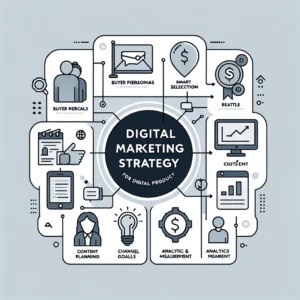A product manager plays a crucial role in an organization by acting as a link between the engineering, marketing, and business teams. They are responsible for defining the product vision, prioritizing features, and ensuring that the product meets the needs of the customers. In this article, we will explore the key benefits of having a product manager onboard in an organization.

Looking for a product manager? Chat with me!
1. Alignment of Business and Product Strategy
A product manager helps align the business goals with the product strategy. They understand the market and customer needs and can translate them into actionable plans for the engineering team. By focusing on the customer’s pain points and market trends, a product manager ensures that the product roadmap is in line with the overall business objectives.
Example: Let’s consider the case of Apple’s iPhone. The product manager identified the need for a smartphone that combines a phone, an iPod, and an internet communication device. This vision aligned with Apple’s goal of revolutionizing the mobile phone industry and resulted in the successful launch of the iPhone.
2. Improved Product Development Process
A product manager acts as the voice of the customer within the organization. They gather user feedback, conduct market research, and collaborate with the engineering team to prioritize and define product features. By understanding the customer’s needs and pain points, a product manager ensures that the product development process is focused and efficient.
Example: Slack, a popular team collaboration tool, had a product manager who worked closely with the engineering team to prioritize features based on user feedback. This iterative approach resulted in continuous improvements and a user-friendly product that meets the needs of different teams and industries.
3. Effective Cross-Team Collaboration
A product manager facilitates effective collaboration between different teams involved in the product development process. They work closely with engineers, designers, marketers, and sales teams to ensure that everyone is aligned and working towards a common goal. By fostering collaboration, a product manager helps in delivering a cohesive and high-quality product.
Example: Airbnb has a product manager who acts as a bridge between the engineering and design teams. They collaborate to create a seamless user experience by considering both the technical feasibility and the user interface design.
4. Market and Competitor Analysis
A product manager stays updated with market trends and competitor offerings. They conduct regular market analysis to identify new opportunities, potential threats, and emerging technologies. This information helps in making informed decisions about product features, pricing, and positioning.
Real-case examples of companies that have benefited from having a product manager
According to the provided information, there are several companies that have benefited from having a product manager. Some examples include:
- Amazon: Amazon is known for its customer-centric approach to product development and is considered one of the best companies for product managers3. They have a strong focus on providing the best products and have successfully utilized product management principles in their business2.
- Google: Google is another company that has benefited from having product managers3. With a wide range of products and services, Google relies on effective product management to ensure successful product launches and improvements.
- Apple: Apple is frequently praised for its product management practices, particularly its ability to create innovative consumer products5. Their product managers play a crucial role in driving the success of their products.
- Microsoft: Microsoft is another company that has benefited from having product managers3. With a diverse range of software and hardware products, effective product management is crucial for Microsoft’s success.
These examples demonstrate the positive impact product managers can have on companies by driving product development, innovation, and customer satisfaction. However, the provided information does not specifically mention real-case examples of companies that have benefited from having a product manager in 2023.
Why is it important for organizations to onboard a product manager?
Onboarding a product manager is important for organizations because:
A product manager is responsible for identifying customer needs and business objectives
and translating them into product features and success criteria1. By having a dedicated product manager, organizations can ensure that they are building products or features that meet the needs of their customers and align with the larger business goals.
Product management is critical to the overall success of an organization2. A product manager plays a key role in developing and innovating products or services throughout their life cycle, while also maintaining financial growth4. By having a product manager onboard, organizations can better manage the product life cycle and ensure that their offerings remain competitive and profitable.
Organizations that focus on solving their customers’ pain points are the ones that endure, and product managers play a significant role in this process3. A product manager is responsible for understanding customer pain points and actively working to solve them, which helps build customer loyalty and drive long-term success for the organization.
Product managers are crucial for ensuring team alignment and collaboration5. They rally the team around a shared vision and ensure that everyone is working towards the same goals. By having a product manager onboard, organizations can improve communication and coordination among cross-functional teams, leading to more efficient and effective product development.
In conclusion, onboarding a product manager is important for organizations because they bring expertise in identifying customer needs, driving business success, managing product life cycles, solving customer pain points, and fostering team alignment. The provided information covers these key reasons for the importance of product managers in organizations.
How can a product manager contribute to the success of a company?
A product manager plays a pivotal role in the success of a company. They are responsible for bringing a product from conception to market, ensuring its success throughout its lifecycle. In this article, we will explore the key contributions a product manager makes to an organization’s success.
Defining the Role of a Product Manager
A product manager is responsible for defining and executing the product strategy. They act as the bridge between various stakeholders, including the development team, marketing team, and customers. They gather insights from these stakeholders and use them to prioritize features, define product roadmaps, and make data-driven decisions.
Market Research and Customer Insights
One of the primary contributions of a product manager is conducting market research and gathering customer insights. By understanding the market landscape, competition, and customer needs, they can identify opportunities and define product features that address these needs. For example, a product manager at a music streaming service may analyze user data to identify a demand for personalized playlists. They can then work with the development team to implement this feature, resulting in increased user engagement and satisfaction.
Defining Product Strategy and Roadmap
A product manager is responsible for defining the product strategy and roadmap. They collaborate with key stakeholders to align on goals and objectives. By translating these goals into actionable plans, they ensure that the product development is focused and aligned with the company’s vision. For example, a product manager at an e-commerce company may define the strategy to enhance the mobile shopping experience. They can then create a roadmap that includes features like a seamless checkout process and personalized product recommendations.
Cross-functional Collaboration
A product manager acts as a connector between different teams within an organization. They work closely with the development team to ensure that product features are implemented efficiently and meet the desired quality standards. They collaborate with the marketing team to define go-to-market strategies and messaging. Additionally, they gather feedback from customer support teams to identify areas for improvement. By fostering cross-functional collaboration, a product manager ensures that everyone is aligned and working towards a common goal.
Adaptability and Iterative Improvement
A successful product manager is adaptable and embraces an iterative approach. They constantly gather feedback from customers, analyze metrics, and iterate on the product to improve its performance. For example, a product manager at a social media platform may analyze user engagement metrics and discover a decline in user activity. They can then work with the development team to identify and implement features that increase user engagement, leading to a positive impact on the company’s success
A product manager plays a pivotal role in the success of a company. They are responsible for bringing a product from conception to market, ensuring its success throughout its lifecycle. In this article, we will explore the key contributions a product manager makes to an organization’s success.
Defining the Role of a Product Manager
A product manager is responsible for defining and executing the product strategy. They act as the bridge between various stakeholders, including the development team, marketing team, and customers. They gather insights from these stakeholders and use them to prioritize features, define product roadmaps, and make data-driven decisions.
Market Research and Customer Insights
One of the primary contributions of a product manager is conducting market research and gathering customer insights. By understanding the market landscape, competition, and customer needs, they can identify opportunities and define product features that address these needs. For example, a product manager at a music streaming service may analyze user data to identify a demand for personalized playlists. They can then work with the development team to implement this feature, resulting in increased user engagement and satisfaction.
Defining Product Strategy and Roadmap
A product manager is responsible for defining the product strategy and roadmap. They collaborate with key stakeholders to align on goals and objectives. By translating these goals into actionable plans, they ensure that the product development is focused and aligned with the company’s vision. For example, a product manager at an e-commerce company may define the strategy to enhance the mobile shopping experience. They can then create a roadmap that includes features like a seamless checkout process and personalized product recommendations.
Cross-functional Collaboration
A product manager acts as a connector between different teams within an organization. They work closely with the development team to ensure that product features are implemented efficiently and meet the desired quality standards. They collaborate with the marketing team to define go-to-market strategies and messaging. Additionally, they gather feedback from customer support teams to identify areas for improvement. By fostering cross-functional collaboration, a product manager ensures that everyone is aligned and working towards a common goal.
Adaptability and Iterative Improvement
A successful product manager is adaptable and embraces an iterative approach. They constantly gather feedback from customers, analyze metrics, and iterate on the product to improve its performance. For example, a product manager at a social media platform may analyze user engagement metrics and discover a decline in user activity. They can then work with the development team to identify and implement features that increase user engagement, leading to a positive impact on the company’s success




